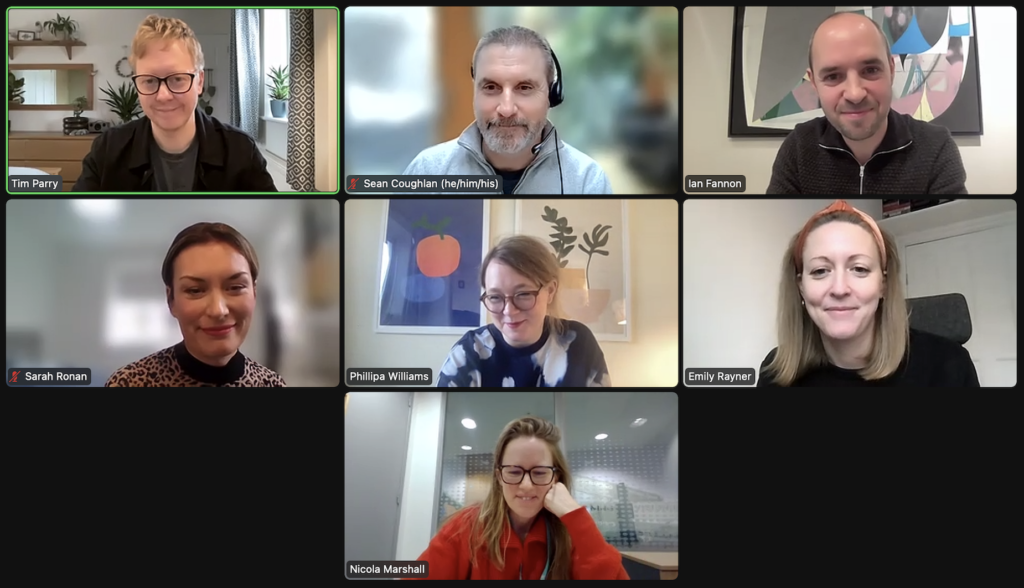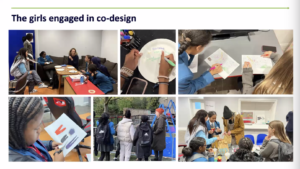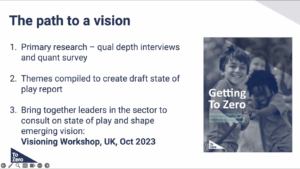Reviewing our event: Children and young people: changing the system – what works?

Thank you to our speakers and guests at our latest event, ‘Children and young people: changing the system – what works?’
The panel centred on the theme of utilising systems change thinking to positively impact the lives of children and young people. It challenged the notion that behaviour change is solely about influencing individual decisions, emphasising that complex societal issues require a more nuanced approach. We aimed to explore this concept through three projects, each addressing systems change challenges at different levels — community, national, and global.
For our first presentation, Sarah Ronan, Director of the Early Education and Childcare Coalition, presented insights into a year-long ambitious effort to unite parents, children, early education childcare providers, and the broader business community around a common goal. Focused on systems change at a national level, the coalition addressed challenges that appear as childcare education gains importance in the political agenda.
Ronan emphasised the importance of incorporating various perspectives and narratives into the discussion, highlighting the role of early education in children’s personal future, affordable childcare as a support net for families, and the broader economic benefits. The project’s aim is to build public support for long-term investment in early education and childcare, employing an approach that involves listening to public perception, unifying stakeholders around a common goal everyone can hold on to, and amplifying multiple voices to frame positive outcomes. As Ian added, “There is no better upstream than early years”.
Second, Nicola Marshall, formerly the Director at the Sweaty Betty Foundation, shared insights into the foundation’s community-focused approach, emphasising the importance of shifting perspectives to understand what teen girls truly think to inform their strategy: “Ultimately someone who isn’t paying for your product or service is the one benefiting from it”. Collaborating with a trusted partner, The Winch in Camden, the project advocated for deep and meaningful participation, involving girls in research and discussions about their lives in a relaxed environment.
Using the COM-B model, the foundation identified challenges faced by girls in the community, from changing rooms they felt uncomfortable in, to societal issues like school rivalries and violence. The output included tangible visuals created by the girls, addressing issues such as respectful treatment by PE teachers or changing room safety. The project successfully influenced the Sweaty Betty Foundation’s trustees to invest in schools and systemic change, underscoring the significance of local community perspectives in driving meaningful transformations.

Finally, Sean Coughlan, Director of To Zero, presented the initiative’s global perspective on addressing childhood sexual violence. Originating from a need for increased collaboration within a fragmented sector, To Zero operates as a time-bound initiative to foster shared vision and engagement from stakeholders. Currently in the discovery phase, the initiative aims to assess the current state of the system globally and envision a future state.
Using the Three Horizons model, To Zero synthesises diverse perspectives to form priorities and an emerging vision: “We can get childhood sexual violence to zero.” The presentation emphasised the importance of a neutral construct and consensus-building in navigating global systems change, highlighting the significance of a unifying vision as a guiding force in addressing a complex issue of this scale. The next steps involve listening, mapping the future, and introducing innovative approaches to rally support for the envisioned change.

In the Q&A session, the panellists shed light on crucial aspects of their systems change initiatives. Sean emphasised the pivotal role of hope in engaging support, stressing the need for a solid, believable future vision. Sarah advocated for drawing inspiration from global success stories to counter negative narratives. Nicola highlighted the importance of engaging where the energy is, especially when dealing with schools and their constraints. When discussing the skills and experience needed for systems change, Sean emphasised the necessity of neutrality and a holistic approach, while Nicola underscored the significance of listening to those within the system and considering commercial aspects. On proving impact, Sarah stressed managing expectations for the long term and recognising that wins may not always manifest as expected. These insights provided a comprehensive understanding of the challenges and strategies involved in driving meaningful change on a systemic level.
Many thanks to all who came. We’ve uploaded a recording on YouTube for anyone who’d like to watch (or re-watch).
